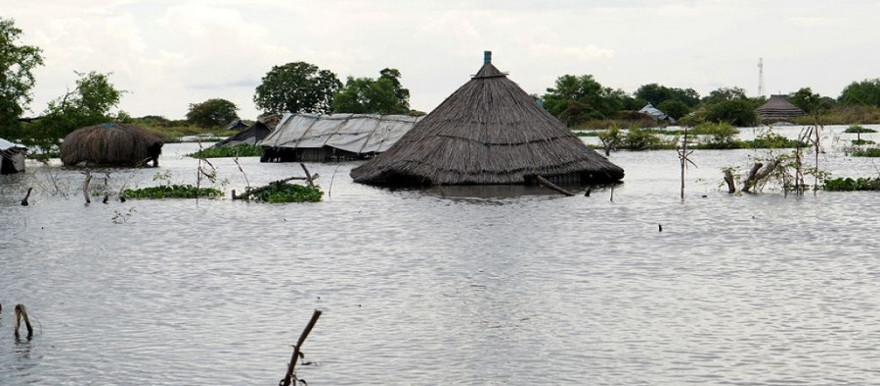Residents displaced by floods in parts of Jonglei State say they feel neglected for months without food aid and healthcare services amidst the Covid-19 pandemic.
The first Covid-19 case was registered in the capital Juba in April. At the time, Jonglei was already hit by floods, and many people were homeless.
Until now, a total of 350,000 people have been displaced, with about 180,000 in Bor town alone, according to the country’s Relief and Rehabilitation Commission.
“We have been left to suffer for months. Even in the middle of this contagious Covid-19 disease, nobody bothers to visit us,” Akello Daniel, a displaced Bor resident said. “We only learned about measures to avoid getting the virus on the radio stations.”
She added, “When I arrived at this school (i.e Malek Secondary School) in July, I received a plastic sheet, though I put a makeshift building, following precautionary measures prove difficult. We lack soap, access to clean water, and washrooms. So we scramble over the limited resources.”
In April, after the country recorded its first case, measures like social distancing and a ban on public gatherings were imposed to help curb Covid-19 spread.
For Amiet Awan, another displaced, observing Covid-19 safety guideline is never an option.
“We left our shelters, utensils, and livelihoods in floodwaters in Twic. Here, for a big classroom, about 20 of us stay together. We fled floodwaters only to get everywhere, even the roads, in Bor Town flooded. Where do you want me to stay? You don’t see! Although Covid-19 exists, I better die of it than expose myself to human attacks,” she furiously told Radio Tamazuj last week.
For his part, Gabriel Deng Ajak, the Jonglei Relief and Rehabilitation Commission director, dismissed the claims that floods victims have not been supported, saying “In our policies, priority goes to the most needy. Almost all of the 182,000 registered displaced in Bor got support.”
According to the head of emergencies at the World Health Organization (WHO), Dr. Michael Ryan, “Roughly one in 10 people worldwide may have been infected by the coronavirus.”
In South Sudan, 2,926 positive cases, including 59 deaths, have been confirmed since April 5.
Dr. Ajak Garang Ateny, the Chief Operation Manager at the Covid-19 Treatment Centre in Jonglei, admitted that the confirmed positive COVID-19 cases could be higher than is reported due to floods.
“In Jonglei, people know that Covid-19 exists, but no one cares because after all floods forced them to be crowded at public places. And also within the town, residents use crowded boats for transport," he said. “So far, we have over 60 cases in Bor. People don’t come for the free tests at the facility as if there was some sort of moral issues attached to the virus.”
Dr. Ajak added, “In the early days, it was thought that coronavirus was a hoax. But people lost relatives to the virus. They saw the sick ones. In the community, people began to admit its existence because they experience symptoms like loss of smell.”
Another displaced, John Gai, urged the government to provide support and control floodwaters, saying they are exposed to other health risks besides Covid-19.
“If the government controls the floods, we would soon return to our homes and start new lives. Nobody wants to stay in this harsh condition,” he stressed.
Dr. Ajak, also appealed to the government to intervene, warning of a dire health situation if the floods victims get no support.
While blaming the government for ignoring the health needs of the floods-stricken citizens in Bor, the medical professional also challenged the displaced to take a lead in the Covid-19 fight.
“It is difficult for them. But they should do things like reporting those with signs to the hospital,” he stressed. “It is true that 80% of patients show mild symptoms. And I think for us the majority fit in this category which is the reason why there is ignorance.”
Meanwhile, Bol Deng, a civil society activist in Bor, urged the government to embark on a long-term plan, saying Covid-19 may not be eradicated so soon.
Amidst the appalling situation in the state, the activist accused the government of shying away from its mandate of service provision to the locals.
“Families who sailed their ways through floodwaters got no support. Government just watches them coming and going to Mangalla and Awerial areas. Schools are reopening so the government should resettle the displaced and provide the settlements with basic services. Now, with Covid-19, their situation is dire.”
In response, Kuol Duom Ager, the acting state governor, said plans are ongoing to resettle and support flood victims in Jonglei.
“As we speak, the government is working with the partners to resettle the displaced in areas like Tharagok and Kondai because schools are being opened. They have also been receiving some foods but only that Bor is overpopulated,” he noted.
The government official, however, admitted that they are unable to adequately respond to floodwaters and its impacts because they have been overstretched.
“Since July, we have been working on the dyke. We fix and it keeps breaking. Like over the last four days, Bor was over-flooded. River Nile rose to 98 cm. But now the situation is under,” Duom concluded.




